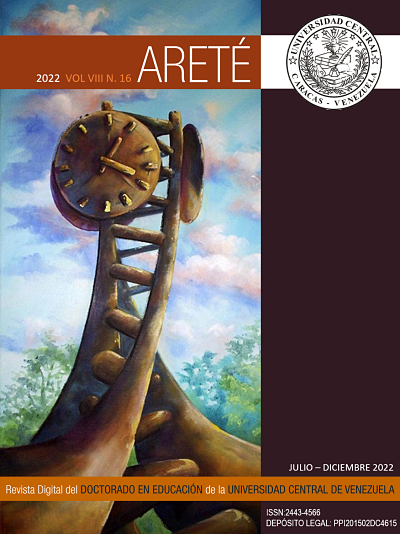The task feedback process of mathematical tasks in undergraduate formative evaluation
Keywords:
Mathematics Education, Formative evaluation, Feedback, Mathematics, Higher educationAbstract
We report on the results of didactical-empirical research in Mathematics Education in which we developed an approach towards undergraduate formative evaluation, with the objective of: defining which is the process for task feedback in mathematics courses and what benefits does it provide to students. Data production was grounded on an interpretative paradigm with descriptive scope in a Mexican university; the participants were 107 students and a teacher, the methods used were participant observation and surveys. The feedback process identified is effective when three moments are fulfilled: 1) the student does a task, 2) the teacher evaluates and 3) the student addresses feedback; by this, the tasks become a learning product that entitles the students to the opportunity to put their mathematical thinking into practice with the possibility of making “mistakes” without worrying about their grades. Also, eight benefits from feedback were identified and grouped into three categories: affective, goal knowledge, and active role as a learning producer. In conclusion, we propose that the identified benefits can be extended transversally during the students passage through higher education and some challenges about the complexity of doing individual qualitative task feedback for the teacher are highlighted.
Downloads
References
Boud, D. (2020). Retos en la reforma de la evaluación en educación superior: una mirada desde la lejanía. RELIEVE, 26(1), art. M3. http://doi.org/10.7203/relieve.26.1.17088
Boud, D. y Molly, E. (2013). What is the problem with feedback? En D. Boud, D. y E. Molloy (Eds.), Feedback in Higher and Professional Education (pp. 1-10). Routledge. https://doi.org/10.4324/9780203074336
Fàbregues, S. y Paré, M. (2016). Capítulo IV. La observación participante. En S. Fàbregues, J. Meneses, D. Rodríguez-Gómez y M. Paré (Coords), Técnicas de investigación social y educativa (pp. 193-221). Editorial UOC. https://bit.ly/3uO1jGd
Fraile, J., Gil-Izquierdo, M., Zamorano-Sande, D. y Sánchez-Iglesias, I. (2020). Autorregulación del aprendizaje y procesos de evaluación formativa en los trabajos en grupo. RELIEVE, 26(1), art. M5. http://doi.org/10.7203/relieve.26.1.17402
García-Jiménez, E. (2015). La evaluación del aprendizaje: de la retroalimentación a la autorregulación. El papel de las tecnologías. RELIEVE, 21 (2), art. M2. http://dx.doi.org/10.7203/relieve.21.2.7546
Geertz, C. (2006). La interpretación de las culturas. Gedisa.
Gómez-Ruiz, M. y Quesada-Serra, V. (2020). Análisis de las calificaciones compartidas en la modalidad participativa de la evaluación colaborativa entre docente y estudiantes. RELIEVE, 26(1), art. M6. http://doi.org/10.7203/relieve.26.1.16567
Henderson, M., Phillips, M., Ryan, T., Boud, D., Dawson, P., Molloy, E. y Mahoney, E. (2019) Conditions that enable effective feedback. Higher Education Research & Development, 38(7). https://doi.org/10.1080/07294360.2019.1657807
McArthur, J. (2020). Participación e implicación del estudiante en la evaluación: implicar a todo el estudiante en la búsqueda de la justicia y el bien social. RELIEVE, 26(1), art. M2. http://doi.org/10.7203/relieve.26.1.17089
Muñoz, M. (2020). Análisis de las practicas declaradas de retroalimentación en matemáticas, en el contexto de la evaluación, por docentes chilenos. Perspectiva Educacional, 59(2), 111-135. https://doi.org/10.4151/07189729-Vol.59-Iss.2-Art.1062
Penalva, C., Alaminos, A., Francés, F. y Santacreu, O. (2015). La investigación cualitativa. Técnicas de investigación y análisis con Atlas.ti. PYDLOS. http://dspace.ucuenca.edu.ec/handle/123456789/22374
Ríos-Cabrera, P. (2020). Metodología de la investigación. Un enfoque pedagógico. Cognitus.
Ríos-Cabrera, P. (2021). Marco referencial para una evaluación formativa. Areté. Revista Digital del Doctorado en Educación de la Universidad Central de Venezuela, 7(13), 75-94. https://cutt.ly/evV29Dj
Zavaleta, A. y Dolores, C. (2021). Evaluación para el aprendizaje en matemáticas: el caso de la retroalimentación. Números. Revista de Didáctica de las Matemáticas, 107, 9-34. http://www.sinewton.org/numeros/numeros/107/Articulos_01.pdf
Downloads
Published
How to Cite
Issue
Section
License
This journal provides free, immediate access to its content under the principle of making research freely available to the public, which fosters a greater exchange of global knowledge.
Authors who publish in Areté, Revista Digital del Doctorado en Educación, agree to the following terms:
- Authors retain copyright and grant the journal the right to be the first publication of the work, as well as licensed under a Creative Commons Attribution License that allows others to share the work with an acknowledgement of authorship of the work and initial publication in this journal.
- Authors may separately establish additional agreements for the non-exclusive distribution of the version of the work published in the journal (for example, placing it in an institutional repository or publishing it in a book), with an acknowledgement of its initial publication in this journal and not to be used for commercial purposes.
- The contents and images included in the articles are the responsibility of the author(s). Areté, Revista Digital del Doctorado en Educación, is not responsible for the information included in them.
- Authors agree with the license of use used by the journal, with the self-archiving conditions and with the open access policy.
- Authors are allowed to disseminate electronically (e.g., in institutional repositories or on their own website) the published version of their work, as it favors its earlier circulation and dissemination and thus a possible increase in its citation and reach among the academic community.
- In case of reuse of published works, the existence and specifications of the license of use must be mentioned, as well as the authorship and original source of publication.







